Welcome in, friends! Gather around and listen to a tale of the cool things Disney had planned for us but for one reason or another just weren’t meant to be!
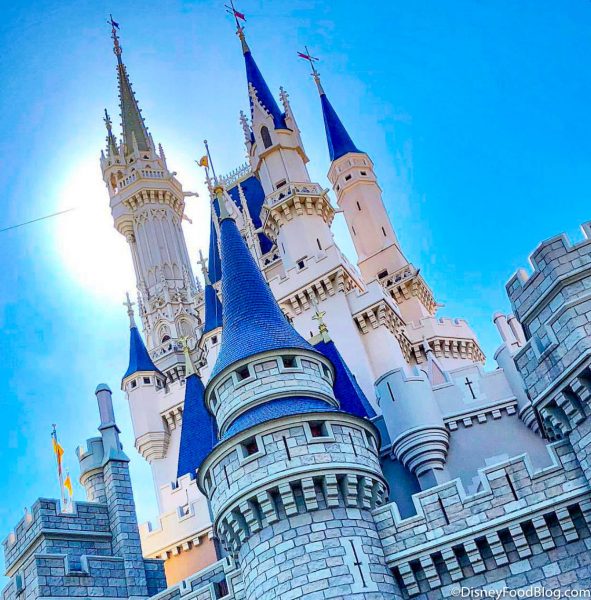
We know what you might be thinking, “Disney? Overly ambitious? Noooo way!” Ahh, but it’s true — although it’s often “fun to do the impossible,” sometimes the impossible isn’t very easy to do!
Let’s explore a few failed projects from Disney’s past. Keep in mind, ALL of these things were officially announced by Disney and many were being worked on at various stages before their plans fell through!
Disney’s America
A third U.S. Disney park???
That’s right — in 1993 Disney announced plans to build a 3,000-acre history-themed park — but only the American parts — right outside of Washington, D.C. in Prince William County, Virginia. The response was generally positive…until a press conference in Disney World less than 2 weeks after the park was announced.
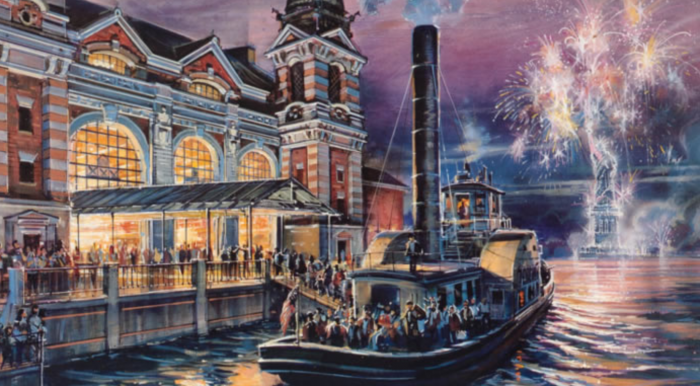
©Disney
Creative Director of the America project and then Senior Vice President of the Walt Disney Company, Bob Weis said, “How can you do a park on America and not talk about slavery? This park will deal with the highs and lows…We want to make you feel what it was like to be a slave, and what it was like to escape through the Underground Railroad.”
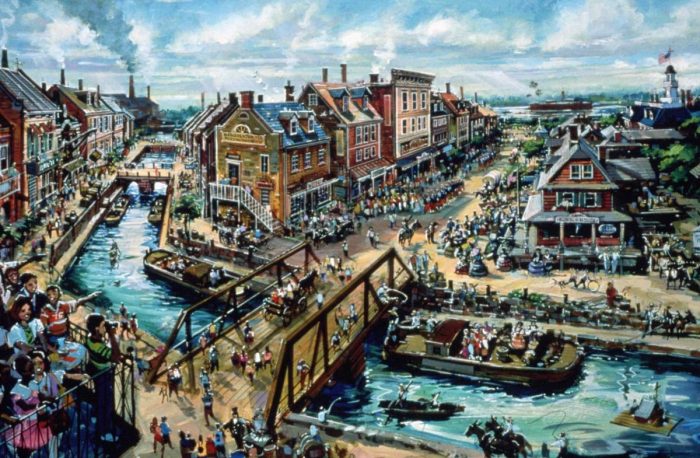
Disney America Concept Art ©Disney
That statement started the downfall of the park. It led then-CEO, Michael Eisner, to dismiss the critical public response to the slavery comment by Weis. He said people couldn’t possibly expect they were going to whip guests like slaves. He stated further, “We’re not going to put people in chains.”
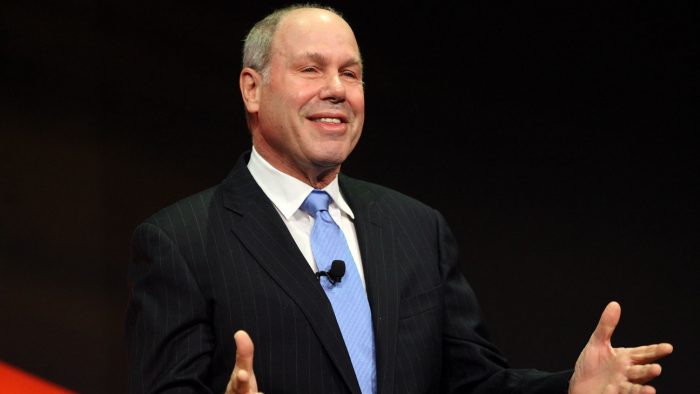
Michael Eisner (Photo by Bryan Bedder/Getty Images for Nickelodeon)
Not surprisingly, the idea of “Disneyfying” some of America’s historical lows didn’t sit well with many. This led to growing concerns that Disney could do more damage to American history than good.
The head organizer for the Black History Action Organization called for a boycott of the proposed park. She felt that slavery was not suitable content for a theme park setting and she feared it would result in, “little souvenir slave ships” sold in the gift shops, among other things.
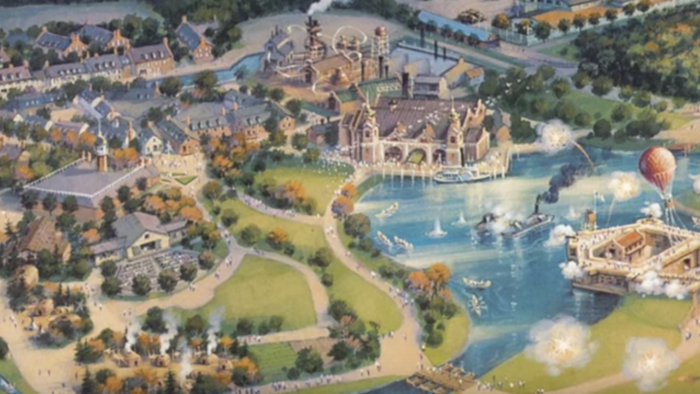
Disney America Concept Art ©Disney
There was fear that the lure of a flashy theme park would take visitors away from the tourist sites in D.C. Even the land they selected was brought into question — it was steps away from some of the largest battles of the Civil War. Many thought it was in bad taste to have the next Disneyland adjacent to where hundreds of thousands had died. There was fear the historical land in the area could be destroyed over time by increased visitors.
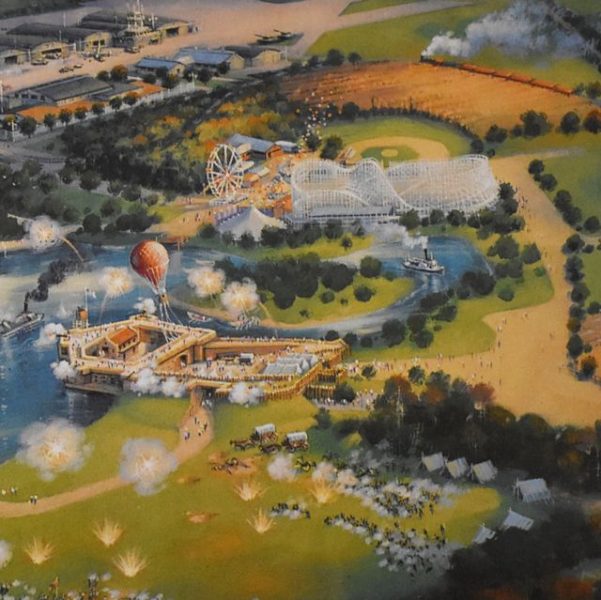
Disney America Concept Art ©Disney
In response, a large group of American historians publicly opposed the project. As public approval of the project grew, protests began to take place in the nation’s capitol demanding Disney be stopped. With growing public disapproval, Eisner informed the public they were backing out of the project one year after it was announced.
But Disney didn’t scrap this project entirely. Bob Weis’ next project was Disney California Adventure. A few rides proposed for the America project were worked into this new park. Soarin’ Over California and the Condor Flats section of the park were pulled from ideas for the America park. Grizzly River Run came from an idea for a Lewis and Clark expedition-themed white water rafting ride.
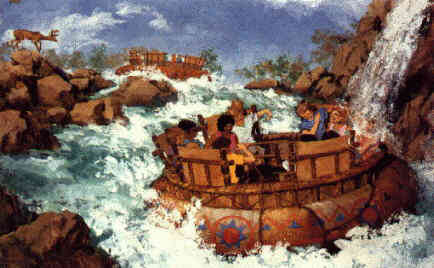
Lewis and Clark Expedition Ride Concept Art ©Disney
Next time you’re walking around Disney Califonia Adventure in Disneyland, keep an eye out for carryovers from this failed America park!
Hyperion Wharf
Remember when Downtown Disney (now Disney Springs) had a whole section called “Pleasure Island?” Back in 1989 the section that sits between the Marketplace and the West Side was opened as Pleasure Island, a diverse warehouse district loaded with unique clubs open each evening. It was branded as an escape for adults and for a number of years it was quite popular.
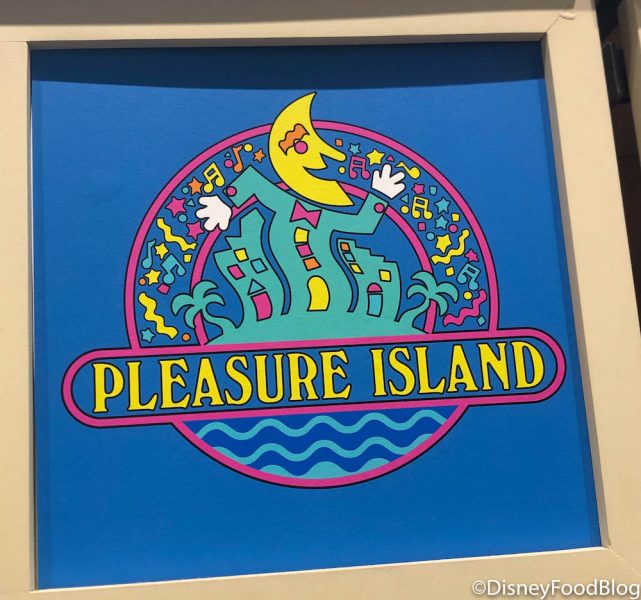
Pleasure Island Logo
After the turn of the century, though, interest started to wane and Disney began looking for ways to inject life into the space. In 2005, Disney leased a large portion of the land to what would later become Raglan Road Irish Pub but was having trouble finding other tenants in such an “adult-oriented” space.
The clubs that inhabited Pleasure Island began to close their doors due to lowered interest and the ongoing recession, and in 2008 the last clubs there closed their doors.
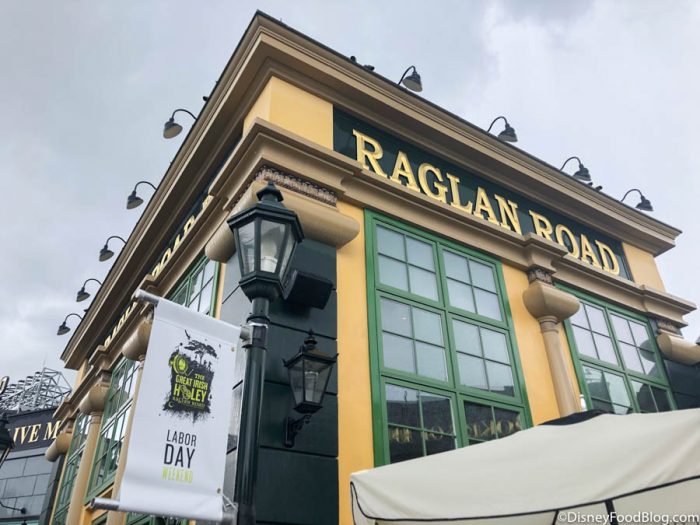
Raglan Road Was the First Resident Post-Pleasure Island
Desperate for a way to fill the gap between the marketplace and the West Side, in 2010 Disney announced construction on a new project to fill the space called Hyperion Wharf.
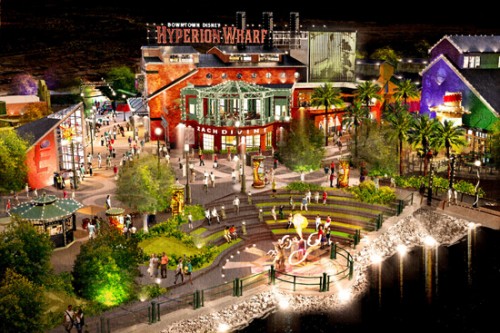
©Disney
Disney called Hyperion Wharf, “a nostalgic yet modern take on an early 20th-century port city and amusement pier…by day, the bustling port district will draw guests in with its stylish boutiques and innovative restaurants and by night, thousands of lights will transform the area into an electric wonderland.”
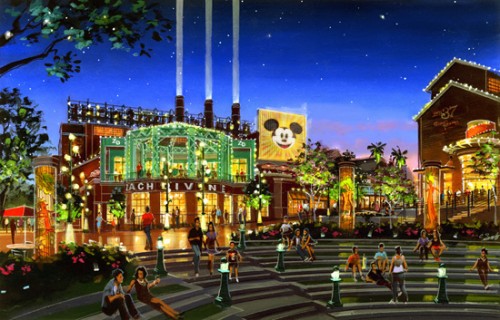
©Disney
Demolition even began on the site, but stopped almost as abruptly as it began in February of 2011. The Pleasure Island signs remained up, but construction walls surrounded the now-demolished site. And it sat that way for 2 years.
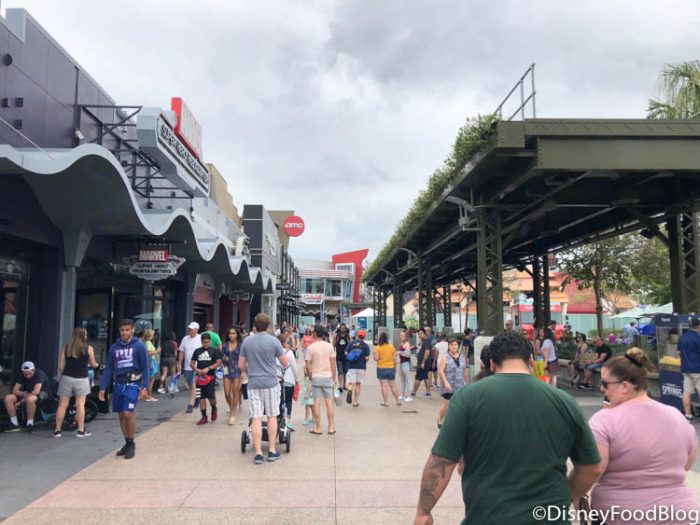
Disney Springs
In March of 2013, plans for Disney Springs were announced. They promised to completely rebrand the entirety of Downtown Disney into one coherent themed shopping district.
The Marketplace and West Side sections remained but the area that Pleasure Island resided in was rebranded as The Landing, better blending in with its surrounding areas. By 2015 the majority of work was completed on Disney Springs and the area was officially rebranded to what we know today.
Main Street Theater
If you’ve been to Disneyland’s Disney Califonia Adventure, you may be familiar with the Hyperion Theater. This is California Adventure’s large, dedicated theater that shows broadway-quality versions of some of Disney’s biggest stage shows to guests daily. But did you know Disney World was supposed to receive its own live-stage venue at one time!
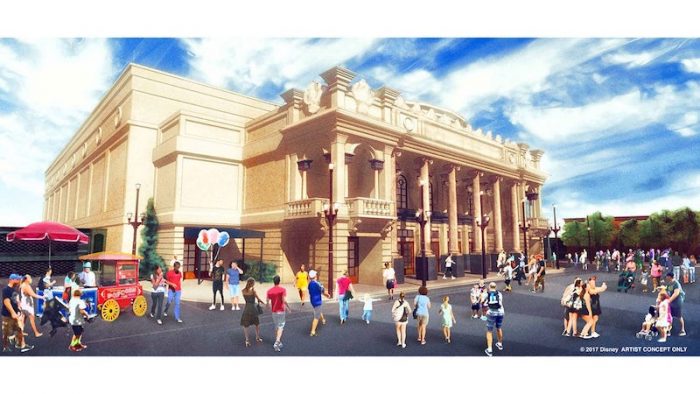
©Disney
The massive indoor theater (which was to be called Main Street Theater) was announced in 2017 and would have been built at Magic Kingdom behind Main Street U.S.A. Guests would have accessed the theater near Tony’s Town Square. Permits were filed and artists’ concepts of the building were even released. But the project never broke ground. In 2018 Disney removed it from their page of projects coming soon.
Muppet Studios
Ever wonder why Muppets Courtyard at Hollywood Studios even EXISTS? Don’t get us wrong — we totally LOVE this part of the park, but did you ever wonder how it came to be?
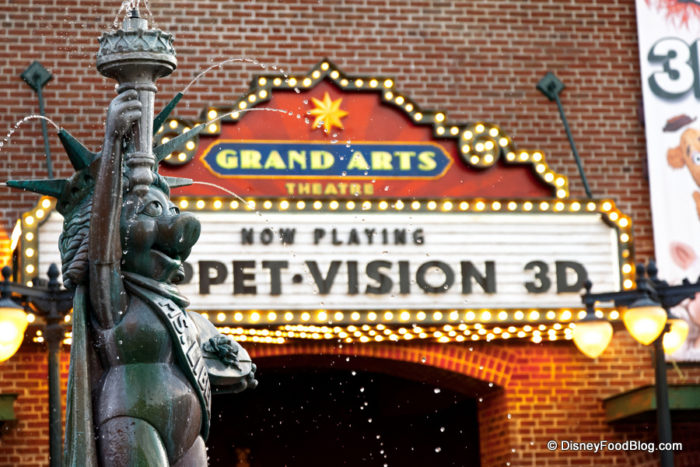
Muppet Vision 3-D
Muppets Courtyard was originally a small piece of a much bigger idea! Disney had conceived of a Muppets Studio land concept which would have included The Great Muppet Movie Ride that Muppets creator Jim Henson described as, “a backstage ride explaining how movies were shot…and all the information is wrong.” There was also a Swedish Chef cooking school, and a pizza joint run by Gonzo!
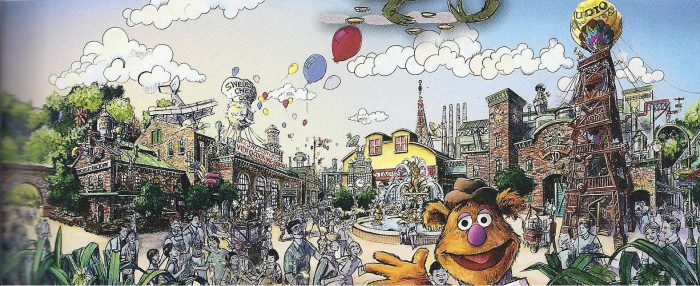
Muppet Studios Concept Art ©Disney
Then-Disney CEO, Michael Eisner, wanted to outright own the Muppets brand and was in deep talks with Jim Henson to make that happen when Disney’s Hollywood Studios (then Disney MGM Studios) opened. Henson was even on hand at the dedication of the park.
Things took a turn though in 1990 when Jim Henson passed away. The first portion of the new Muppet Studios had already been completed at this time but had not opened — Muppet*Vision 3D. Henson’s children decided that they needed to hold on to their father’s legacy and decided to stop all work with Disney on the proposed land or selling of the Muppets brand.
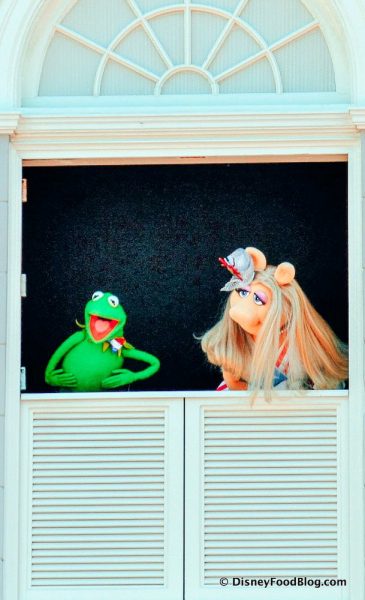
The Muppets
Frank Oz, who voiced a number of the Muppet characters alongside Henson (you might know him better as the voice of Yoda in Star Wars!), spoke to the Henson family pleading with them to let their father’s work on Muppet*Vison 3D be shared with the world. The family agreed and only allowed Disney to open the Muppets Courtyard area with the attraction. The rest of the plans were put to rest.
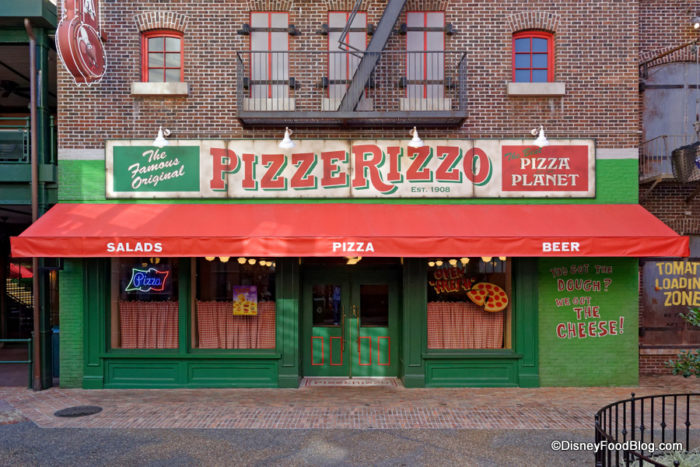
PizzeRizzo
We may not get the Muppet themed land that Jim Henson had envisioned in Hollywood Studios, but the legacy of the characters still lives on in the park. We’ve even seen a slight expansion of the Muppets in the area a few years back when the Pizza Planet restaurant located in the Muppets Courtyard was re-themed as PizzeRizzo, a fast-food pizza joint run by none other than Rizzo the Rat from The Muppets!
Discovery Bay
In the 1970s when Disney was working on adapting Jules Verne’s novel Island at the Top of the World into a movie, Disney Imagineer Tony Baxter developed a steampunk paradise called Discovery Bay.
With Victorian-era architecture fused with technological marvels, the land was going to be inserted into Disneyland where Star Wars: Galaxy’s Edge currently resides. In 1976, a scale model of the land was put on display in Disneyland’s preview center on Main Street, U.S.A. to excite guests about the new land.
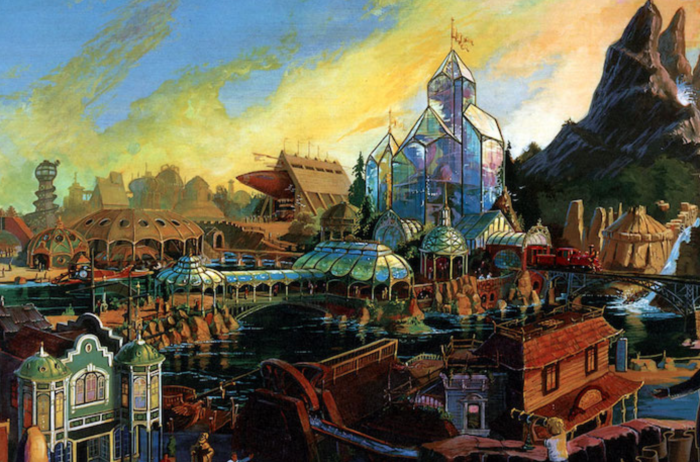
Discovery Bay Concept Art ©Disney
Numerous attractions including a Nautilus simulator and restaurant (both based on Jules Verne’s book 20,000 Leagues Under the Sea), along with a magnetic roller coaster, a river rapids ride, and hot air balloon attraction were in the works for Discovery Bay.
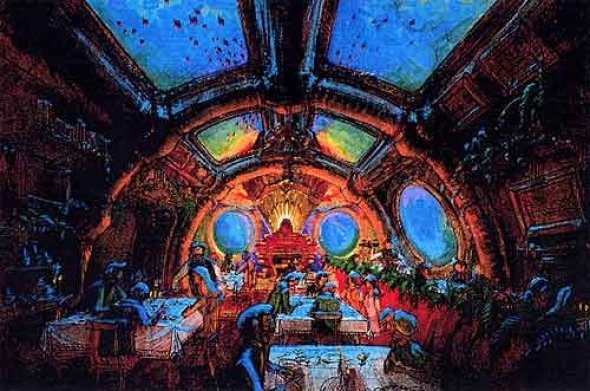
Discovery Bay 20,000 Leagues Restaurant Concept Art ©Disney
Island at the Top of the World, the movie that the land would be framed around, was a box office flop. As Tony Baxter put it, “People are so skittish that instead of saying ‘We did a bad Jules Verne movie,’ they go ‘Well, people don’t want to see Jules Verne movies.’” Executives were scared that if the film had flopped, the idea of a steampunk fantasy world built around the same ideas wouldn’t catch guests’ favor either.
Shortly after, funds and efforts were channeled towards the construction of Epcot and Tokyo Disneyland, and the project was shelved. Some elements of the rides were later applied at other parks such as Tokyo DisneySea’s Mysterious Island and its attractions (also Jules Verne-inspired), and the Dreamfinder’s ship from the original Journey into Imagination attraction at Epcot.
Beastly Kingdom
Have you ever looked at a lamp post or a bench as you enter Animal Kingdom and noticed that a dragon is displayed at the center of the designs?? There’s a reason for it — original designs for the theme park called for a fantasy land that was never built. It was called Beastly Kingdom and it’s where guests could’ve met some very unusual creatures! We’re talkin’ mythological beasts such as dragons and unicorns!
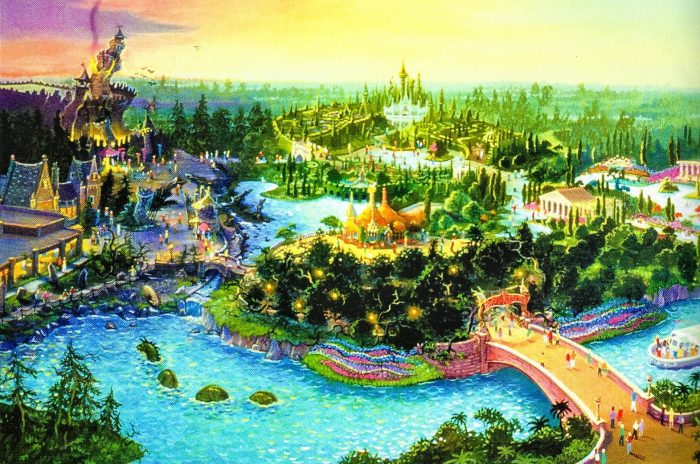
©Disney
The land would have been divided into “Nice, Beautiful, and Dangerous” territories while an attraction called “Quest of the Unicorn” would have taken guests on a maze-like adventure! Beastly Kingdom would have also featured a Fantasia-inspired boat ride with music and characters from the classic film.
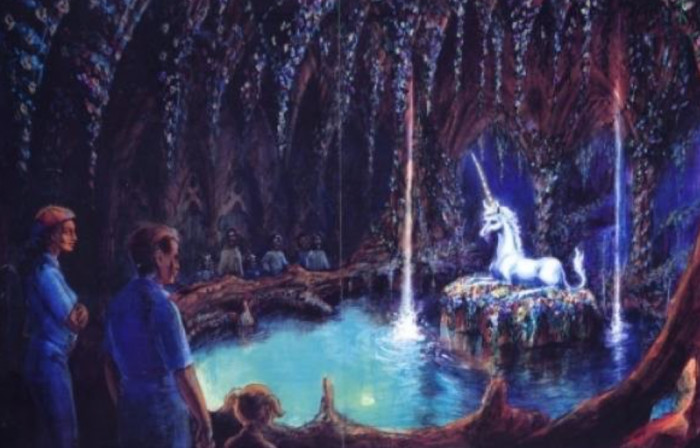
Quest of the Unicorn Concept Art ©Disney
Budget cuts are the reason why Beastly Kingdom never came to be. As Animal Kingdom developed, they realized that caring for so many animals was going to be much more costly than originally anticipated. This led CEO Michael Eisner to have to choose which section of the new park would be cut: Beastly Kingdom or the Dinoland, U.S.A. section of the park. He chose to save Dinoland.
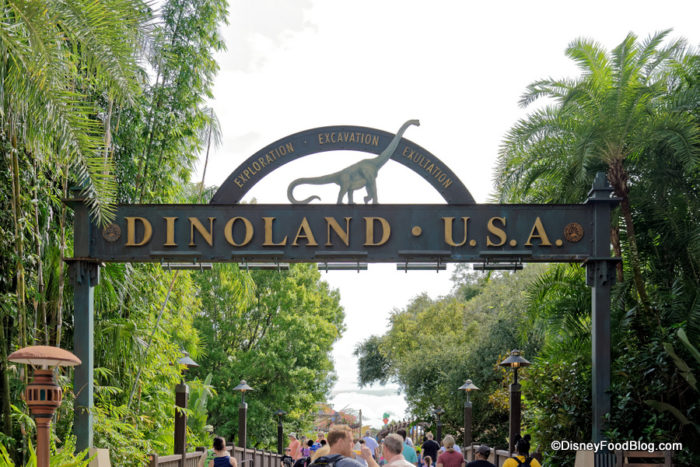
Dinoland, U.S.A. Won Out Over Beastly Kingdom
Pandora: The World of AVATAR currently sits right where Beastly Kingdom was supposed to be. Hey, we didn’t get dragons and forest sprites, but we DID get banshees and the Shaman of Songs!
Disney World’s Phase 2 Resorts
When Magic Kingdom first opened its gates in 1971, two resorts opened with it: Disney’s Contemporary Resort and Disney’s Polynesian Village Resort. Disney World’s Phase 2 plans included Asian, Venetian, and Persian-themed hotels built along Seven Seas Lagoon.
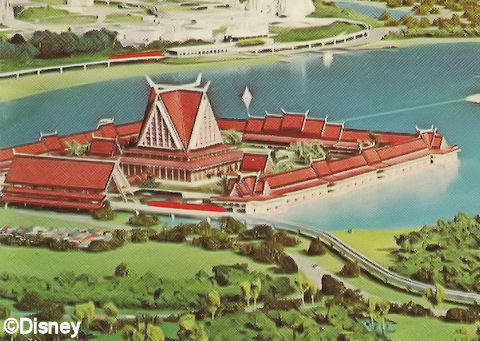
Asian Resort Concept Art ©Disney
The main reason these resorts never saw the light of day was the 1973 oil embargo. Tourism dropped off significantly causing Disney to divert funds to the construction of a new park to lure in guests — Epcot.
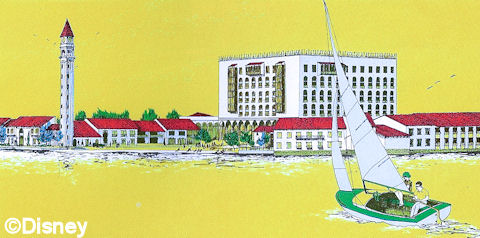
Venetian Resort Concept Art ©Disney
The other reason that construction never took off was that the shores that the resorts were planned to reside on were too unstable to build on. When workers initially hammered pylons into the swampy earth to test out the sites, the pylons were swallowed up by the soft ground beneath them. Construction costs would have had to rise significantly to offset the issues with the terrain.
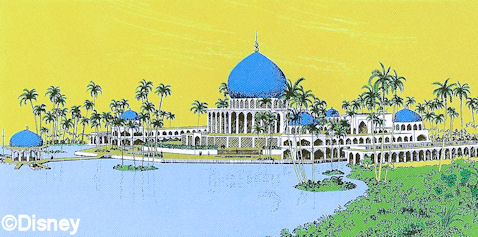
Persian Resort Artwork ©Disney
Eventually, work on resorts resumed, but CEO Michael Eisner decided that guests would rather not visit heavily culturally themed resorts and instead focused on a seaside hotel inspired by the lavish resorts on the Floridian beaches — Disney’s Grand Floridian Resort and Spa.
Epcot’s Unbuilt Pavilions
When Epcot opened in 1982, there were a total of nine pavilions in the World Showcase; there are now 11. But did you know there’s actually space for a LOT more pavilions to come to World Showcase? Disney announced plans for Phase 2 pavilions which include the countries of Equatorial Africa, Israel, Spain, and Venezuela back in the early 80s.
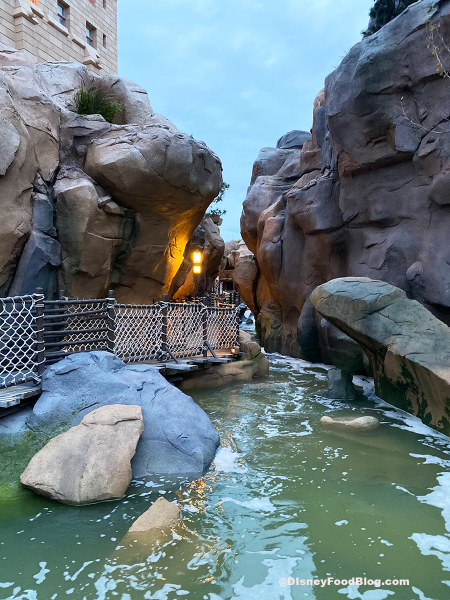
Canda Far and Wide
Plans for most of these never-built pavilions were halted over financial troubles. In some cases like Spain, deals were negotiated to begin construction, but changes in the leadership of the country caused plans to fall through. And over the years, it seemed like Italy and Germany might be getting a new neighbor when Puerto Rico, Iran, Soviet Union, and Switzerland were in talks to fill in the empty space. As you can see, none of these plans were successful either.
The Legendary Years
Ever wonder why Disney’s Pop Century and Disney’s Art of Animation Resorts almost have an identical layout? It’s because they were originally part of the same project! While one-half of Disney’s Pop Century Resort called “The Classic Years” opened in 2003, Disney’s Art of Animation was supposed to be the other half of the SAME resort! It was going to be called “The Legendary Years” and its buildings were going to be themed after the 1900s-1940s!
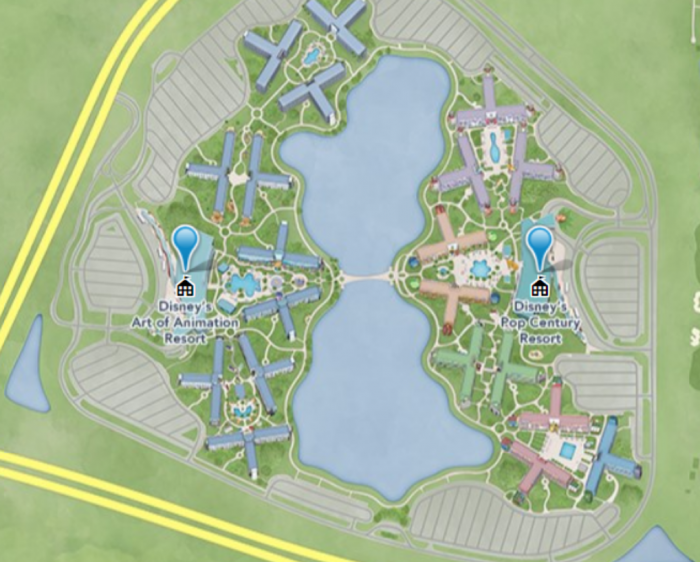
©Google
In 2001, before Pop Century even opened, The Legendary Years section was abandoned to cut costs during a recession. For years, guests could see the clearly abandoned hotel just across the bridge from Pop Century.
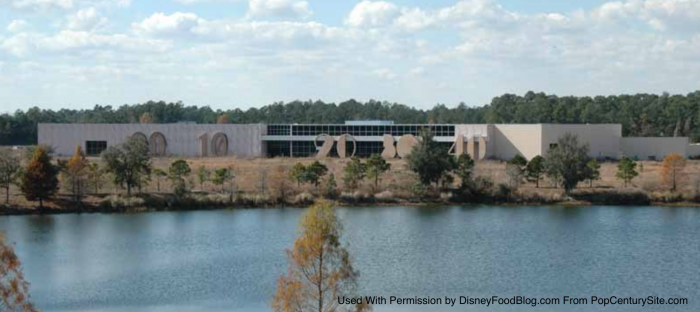
Disney World Legendary Years Hotel
Construction did eventually resume and the build-out was completed in 2012 as Disney’s Art of Animation Resort. Instead of getting a Roaring 20’s theme (maybe not as…um…kid-friendly as once believed?), the resort now features themed rooms and family suites based on The Lion King, Cars, The Little Mermaid, and Finding Nemo.
Disney’s River Country
While you might know all about Typhoon Lagoon or Blizzard Beach, Disney World’s very first water park is long gone! Disney’s River Country was originally located on the shores of Bay Lake near Disney’s Fort Wilderness Resort and had a similar rustic vibe. The water used in the park was even sourced directly from Bay Lake and a number of slides allowed visitors to slide into the open waters of the lake!
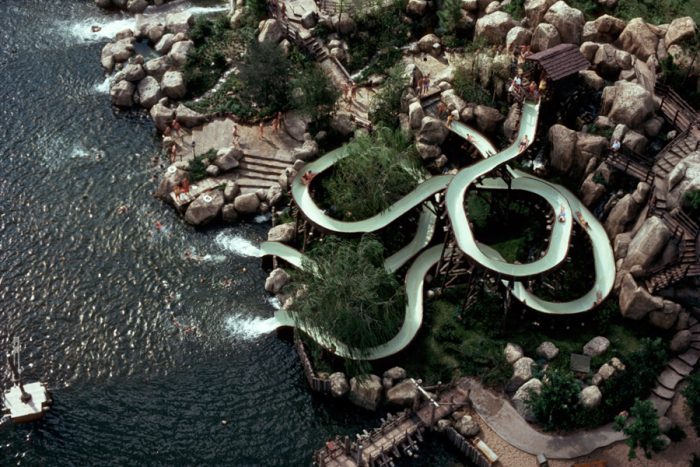
©Disney
Although the water park had been there since 1976 and was only supposed to close down temporarily for a scheduled winter refurb in 2001, it never reopened. This was around the same time that the Legendary Years hotel was abandoned for a similar reason — the 9/11 recession. To cut costs, Disney just never reopened the park. It sat abandoned for years until very recently when it was demolished to make way for Reflections — A Disney Lakeside Lodge.
Disneyland’s Luxury Hotel
In March of 2018, Disneyland announced plans for a new luxury hotel near Downtown Disney. Disney planned to build a 4-Diamond resort after the City of Anaheim introduced a tax break geared specifically at this level of luxury resort being built in city limits.
Disney shifted the location of the resort slightly after the initial specifics were agreed upon between Disney and the city, which resulted in a number of Downtown Disney businesses closing to make way for the project including Rainforest Cafe and Earl of Sandwich.
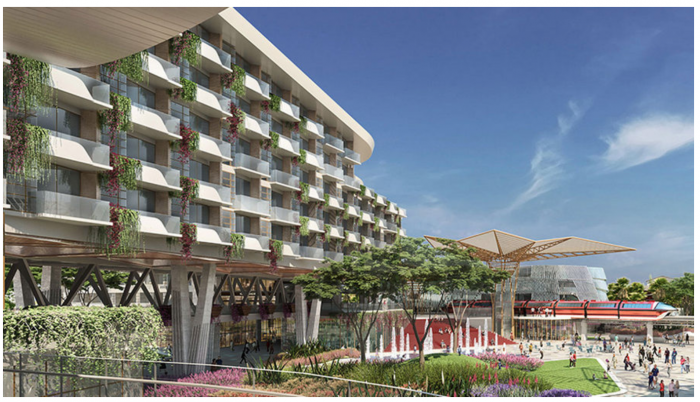
©Disney
The city of Anaheim decided that moving the site of the hotel and the resulting closure of other businesses because of it changed the terms of the project too much, so they put the project on hold. This led Disney to outright cancel plans for the resort. Shortly after the project was canceled it was revealed construction would begin instead on a new Disney Vacation Club 12-story tower adjacent to the Disneyland Hotel.
Port Disney
A planned resort area in Long Beach, CA called Port Disney was announced in 1990. It would have featured a marine-themed amusement park called DisneySea along with a marina, and a cruise ship port! In fact, the RMS Queen Mary would have served as a focal point of the resort! The idea for the park revolved around a heavy focus on conservation and marine life.
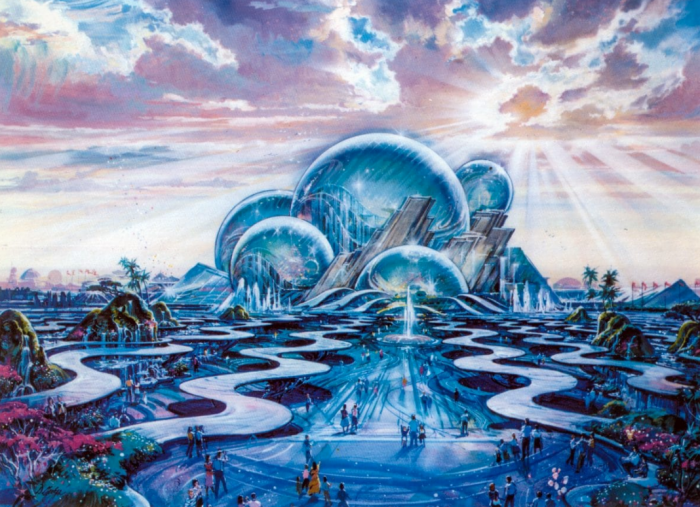
©Disney
Additions to Disneyland in Anaheim required just the city’s approval, but to build in Long Beach required approval of state and local governments, making it much harder for Disney to do as they liked. The project never had a coordinated effort from everyone involved at Disney, so much so that some believed Disney never had a true interest in constructing the park, though millions were spent in the early stages of planning.
Although plans were scrapped for this project in favor of a new project called westCOT (which we’ll get to next), the name DisneySea and some of the ideas for this theme park were taken over to Japan and used for Tokyo DisneySea which opened in 2001.
westCOT
Oh, but things get ever WEIRDER from there for Californians! Similar to Florida’s Epcot, Disney conceived westCOT! It’s basically exactly what you’re thinking! The blueprint even called for replicas of classic Epcot attractions such as Journey into Imagination and an even BIGGER Spaceship Earth! Budget restraints kept westCOT from becoming a beautiful reality.
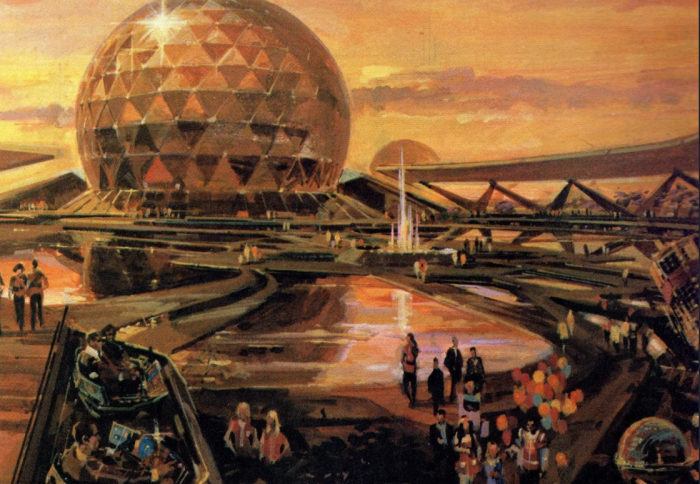
©Disney
Instead of ending up with a bizarro-version of Epcot (and its famous World Showcase BUT with different countries!), we got Disney California Adventure Park instead.
S.S. Disney
Last but not least, let’s discuss one of Disney’s most ambitious ideas — the S.S. Disney. The S.S. Disney wasn’t going to be a cruise ship like you’d find with Disney Cruise Line — it was a full-fledged floating theme park.
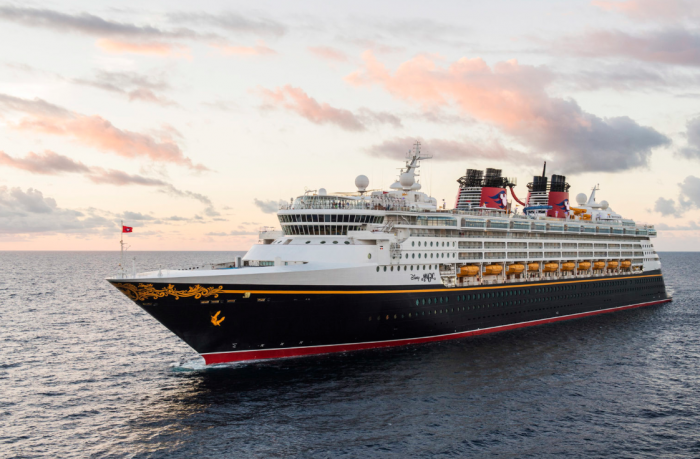
©Disney Magic
16 to 18 classic Disney attractions such as it’s a small world, Space Mountain, Star Tours, Dumbo the Flying Elephant, Mad Hatter’s Tea Cups, and Roger Rabbit’s Toontown Spin were all planned to be aboard! There were also plans for 6 restaurants, gift shops, and more. Guests would board the ship in the morning and have 8 hours at sea to ride rides and explore.
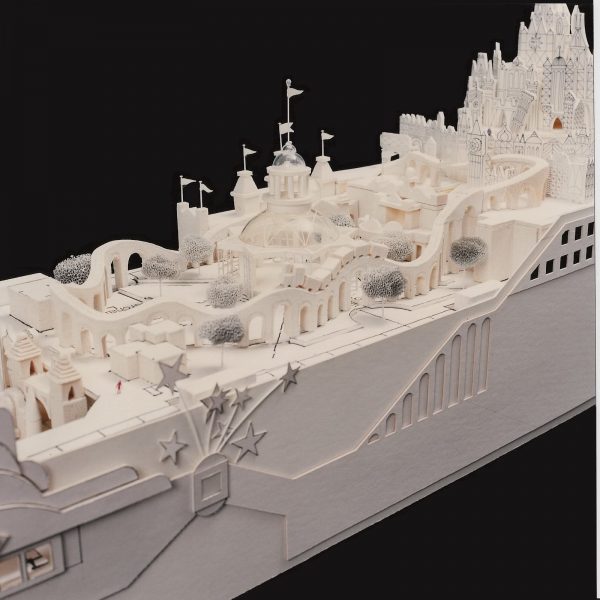
S.S. Disney Model ©Disney
Eisner was on board with the idea (get it?) until his partner and President of the company, Frank Wells, passed away in 1994. The planning group at corporate didn’t want to do a floating theme park any more with Wells out — they wanted to do a cruise ship instead. This began Disney’s foray into cruise lines and in 1998, the Disney Cruise Line set sail.
For all of the incredible lands, theme parks, and more that the Disney Company has created over the years, it’s interesting to take a look back at the projects that didn’t get off the ground.
What do you think of these plans that Disney told us about but never finished? Which ideas would you like to see them revisit someday? Let us know in the comments below!
From our friends at www.disneyfoodblog.com
Filed Under: Animal Kingdom, disney california adventure, disney merchandise, Disney Springs, disney’s hollywood studios, Disneyland, Downtown Disney Anaheim, Epcot, Featured, magic kingdom, News, Tokyo Disney Sea, Tokyo Disneyland, beastly kingdom, broken promises, didn’t deliver, disney california adventure park, disney cruise line, disney world phase 2, disney world’s asian resort, disney’s america, Disney’s Art of Animation Resort, disney’s luxury hotel, Disney’s Pop Century Resort, disney’s river country, disney’s venetian resort, disneysea, epcot phase 2, Epcot World Showcase, hyperion wharf, main street theater, muppets studio, Pandora, phase 2, port disney, ss disney, the legendary years, unbuilt pavilions, westcot
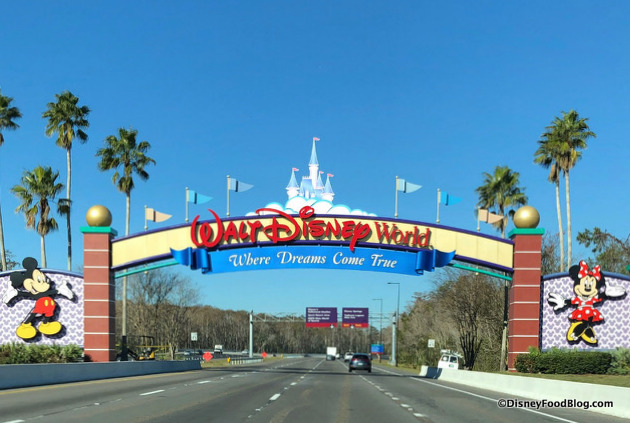
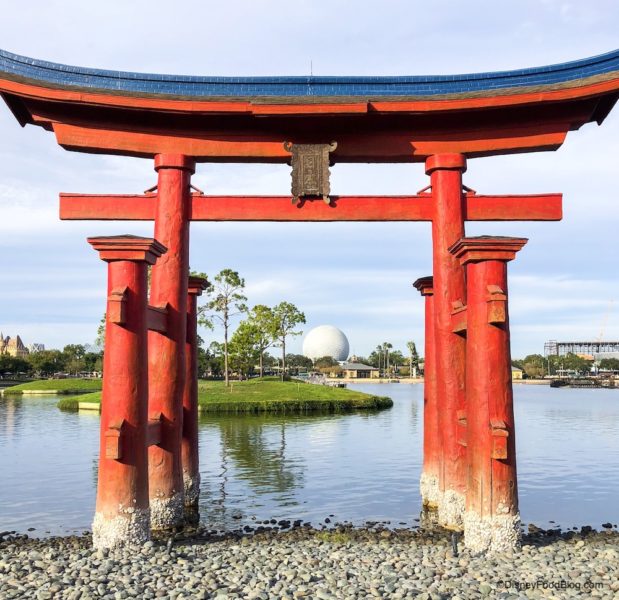
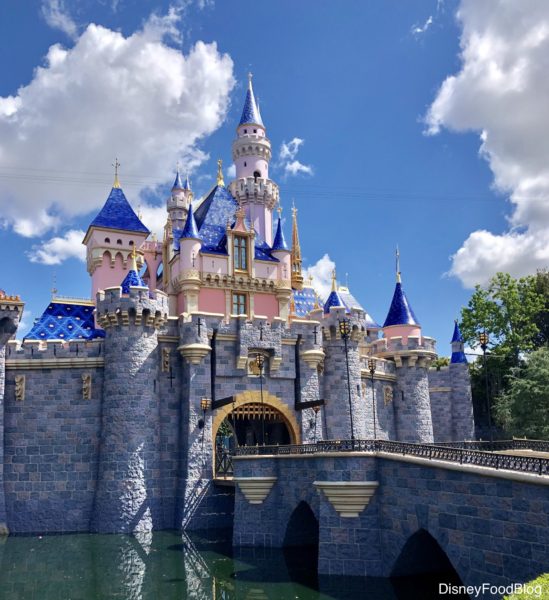
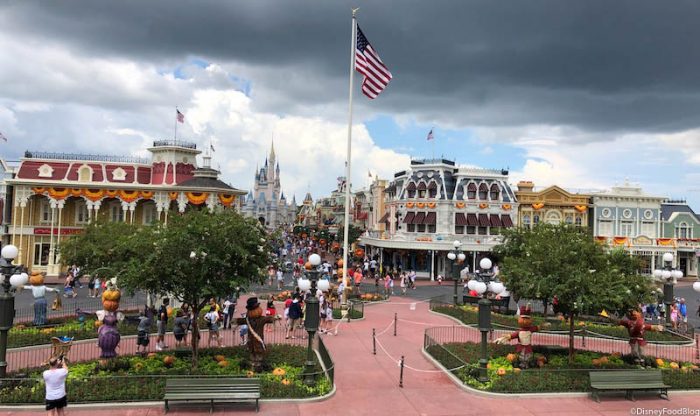
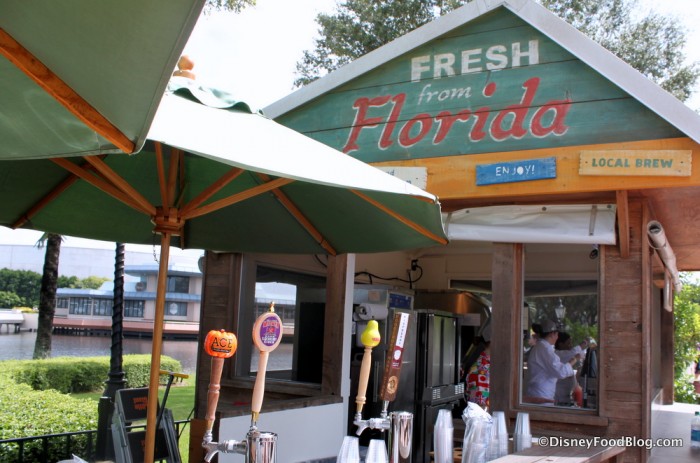
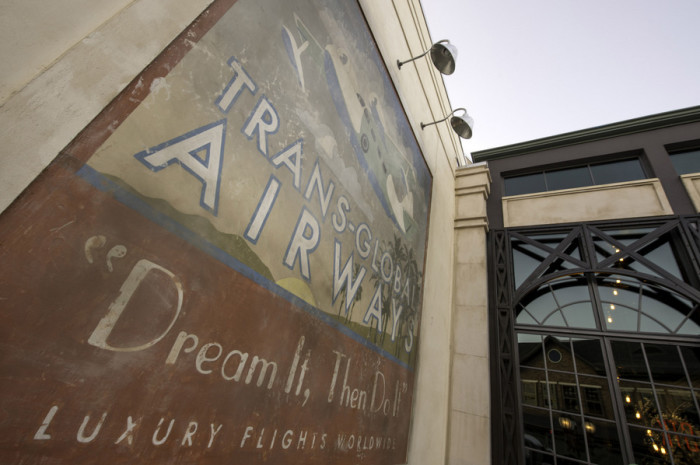
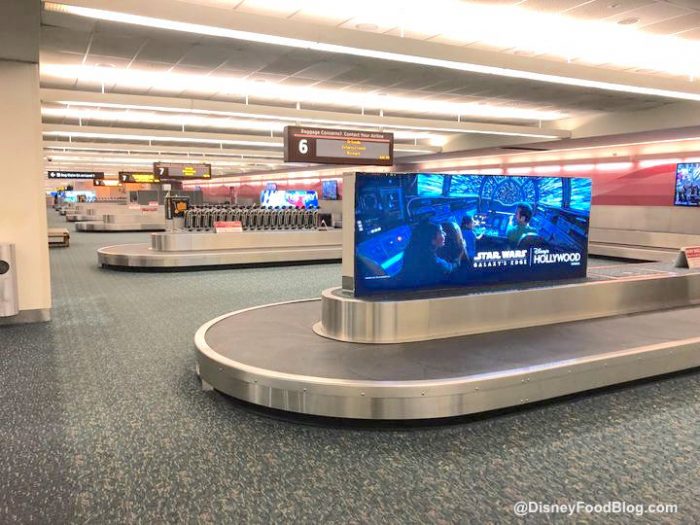
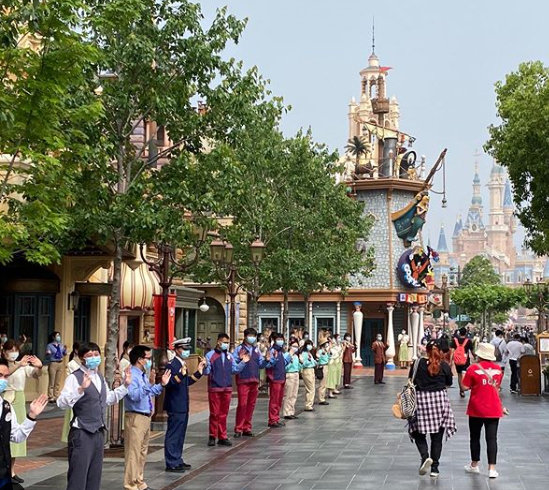
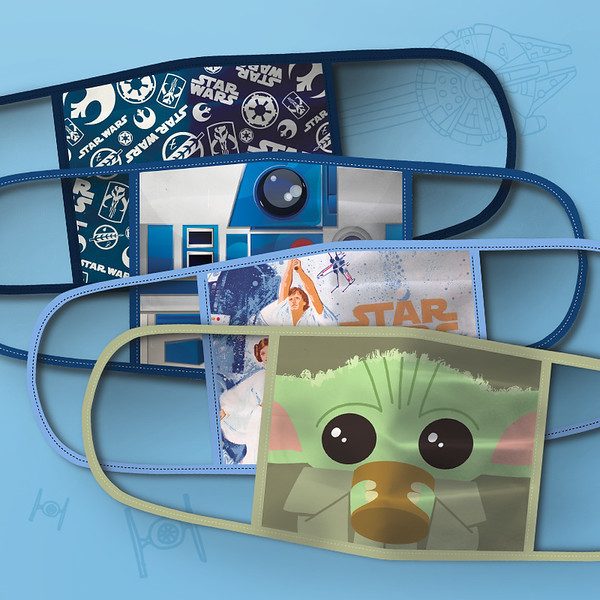
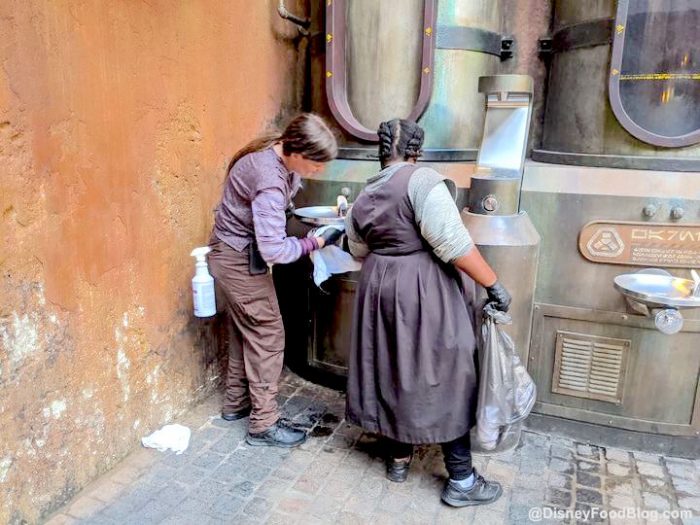


































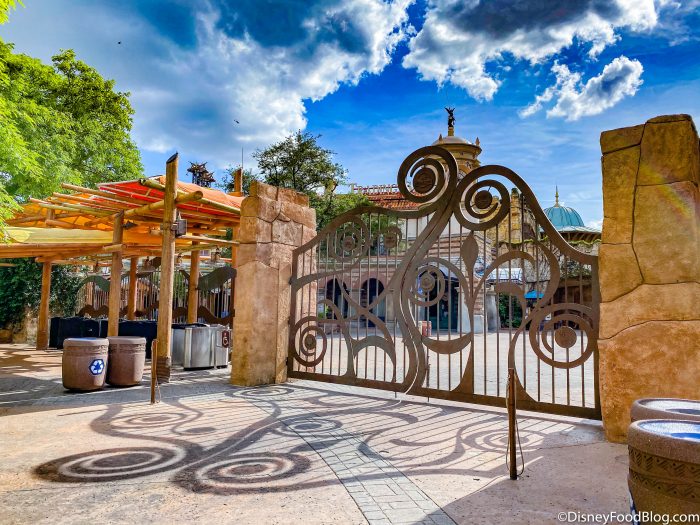

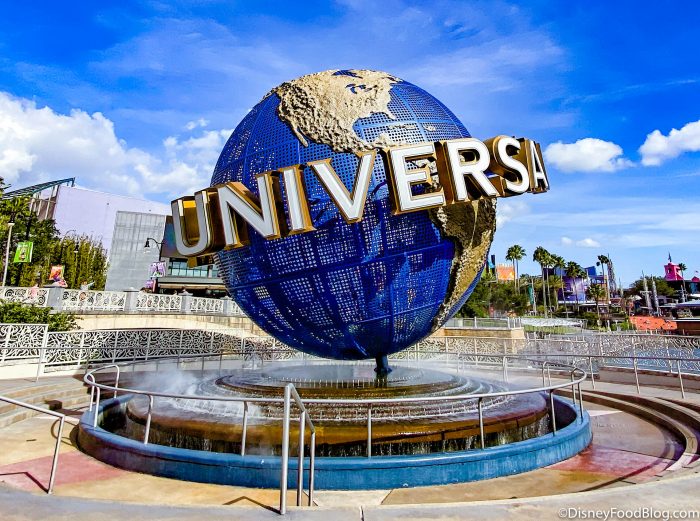
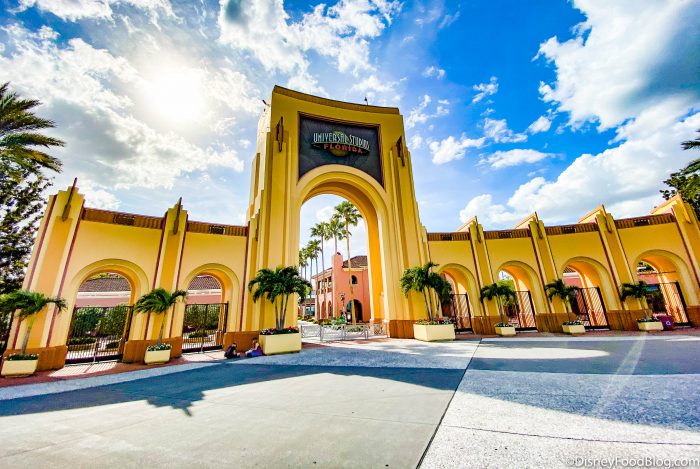
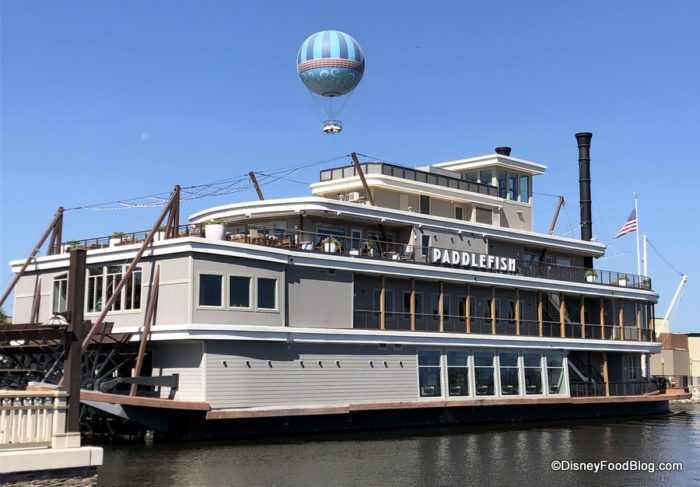
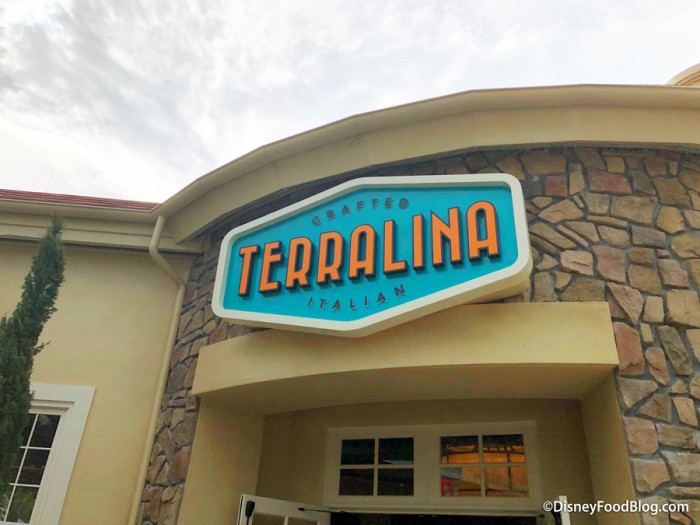
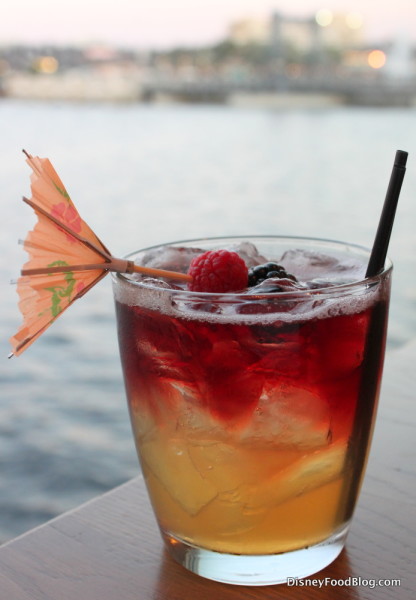
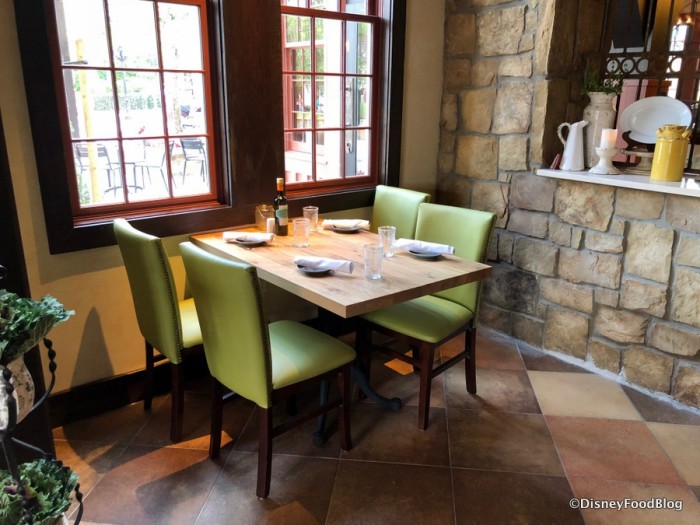
 The newly remodeled McDonald’s at Walt Disney World looks to be nearing completion. We recently took a drive near the fast-food restaurant that’s located near the All-Star Resorts and Animal Kingdom and we’re surprised by its progress. The Walt Disney World Resort has been closed since March with
The newly remodeled McDonald’s at Walt Disney World looks to be nearing completion. We recently took a drive near the fast-food restaurant that’s located near the All-Star Resorts and Animal Kingdom and we’re surprised by its progress. The Walt Disney World Resort has been closed since March with 